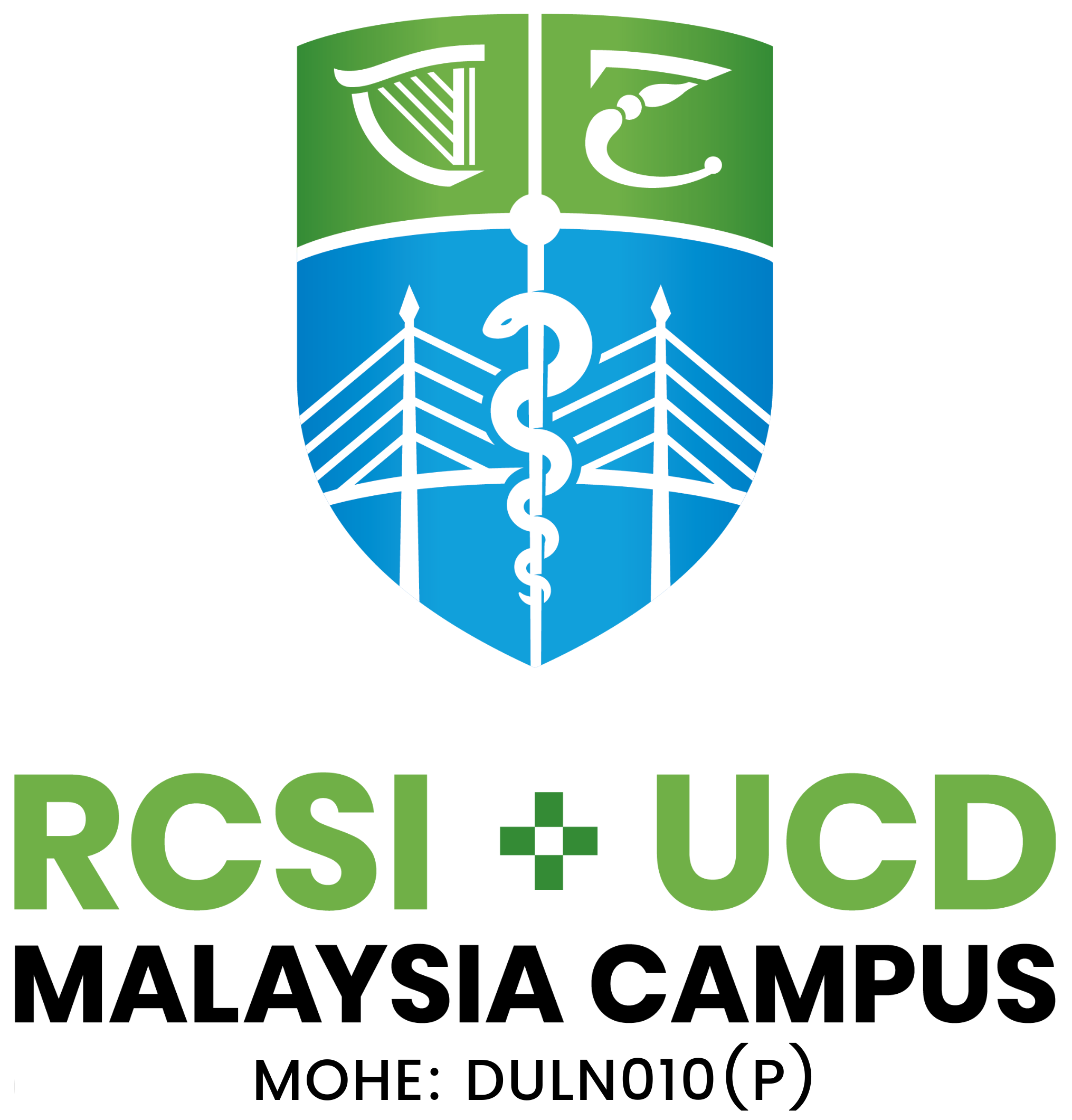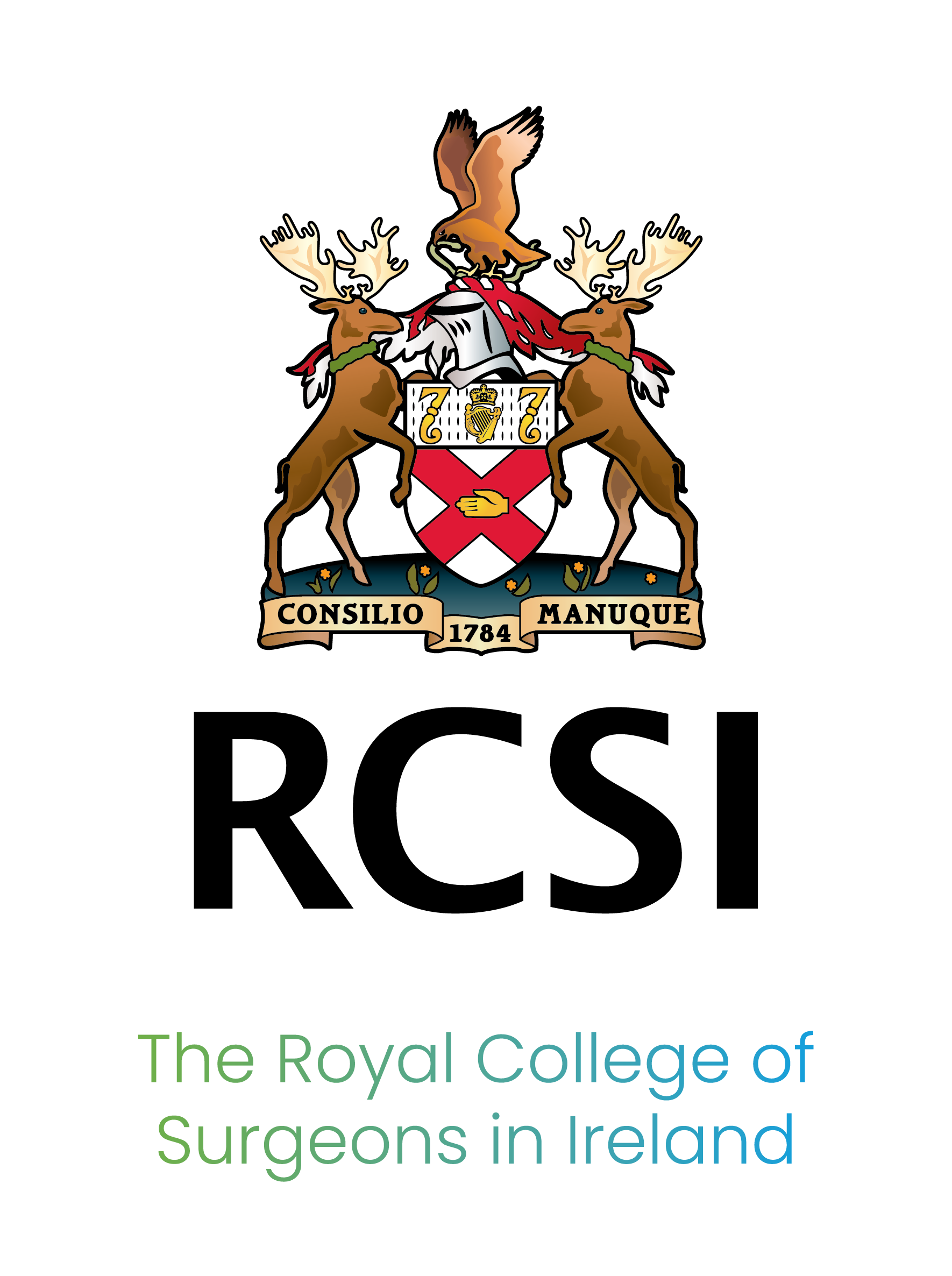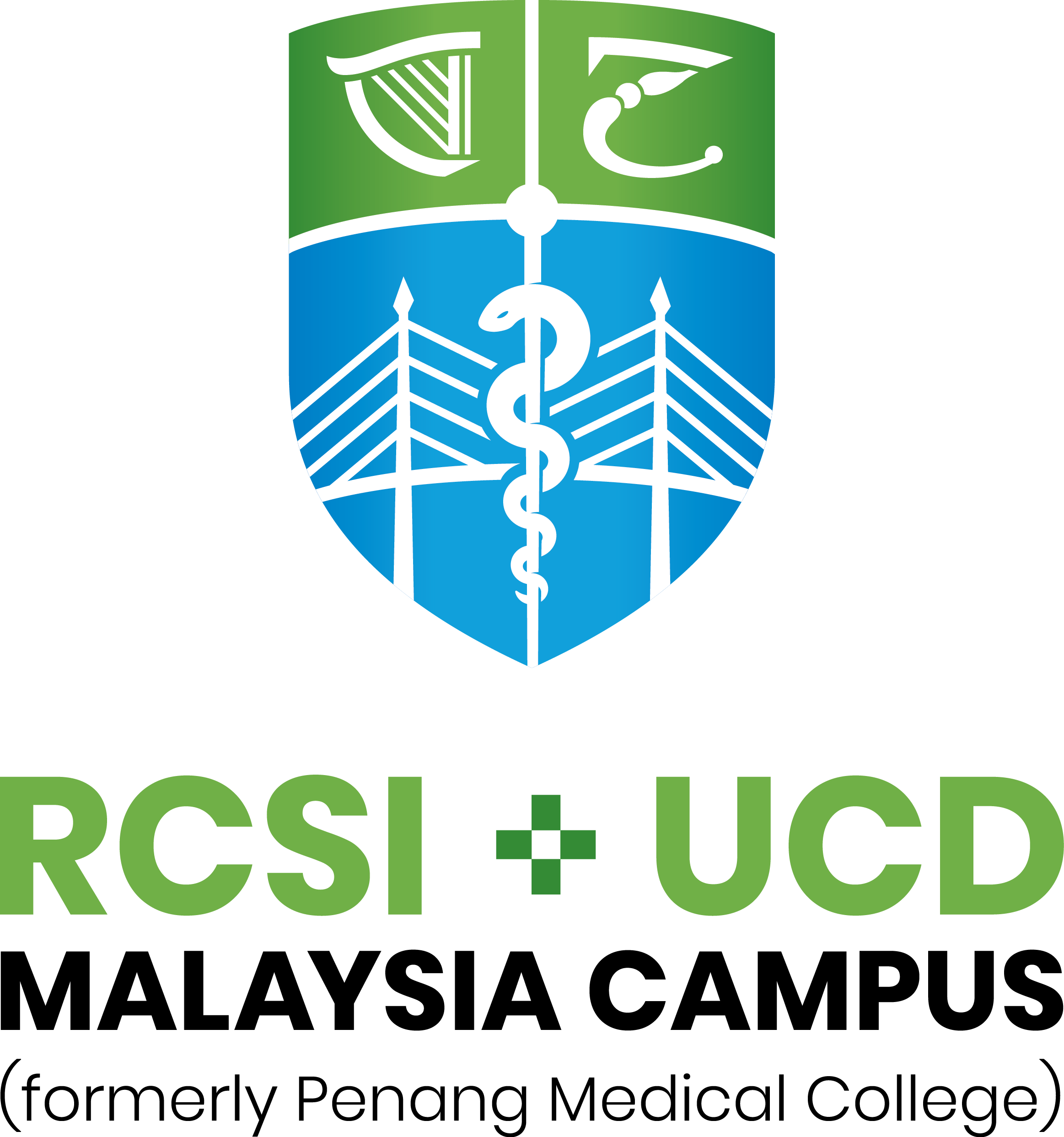Bachelor of Medicine, Bachelor of Surgery (MBBS): Everything You Need to Know
Jan 12 2024
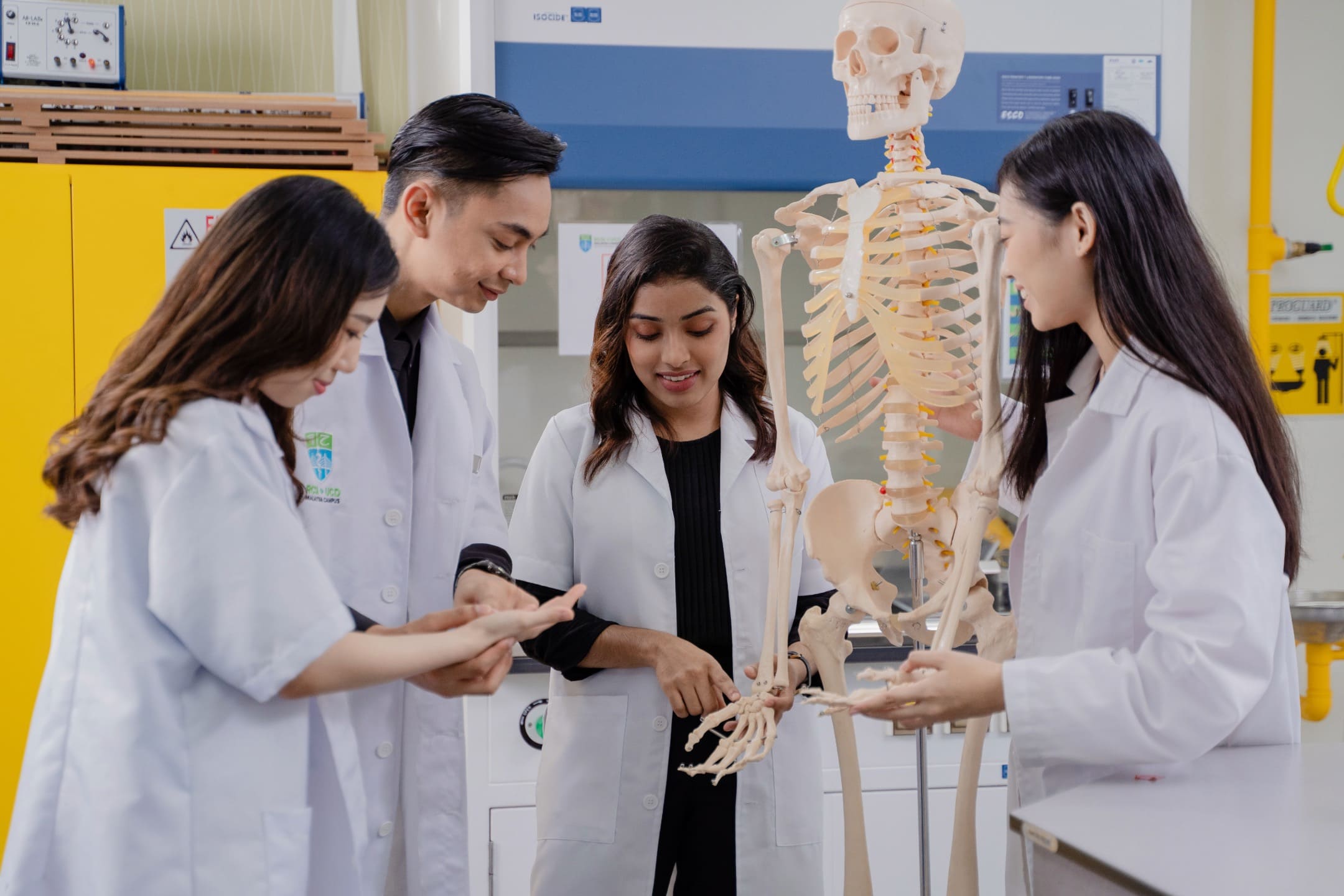
What is Bachelor of Medicine, Bachelor of Surgery (MBBS)
The Bachelor of Medicine, Bachelor of Surgery (MBBS) is an undergraduate degree necessary for pursuing a career in medicine, covering all basic medical sciences and specialisations. It typically spans five to six years, culminating in housemanship where students directly interact with patients under supervision.
History of the MBBS Degree
Historically, physicians and surgeons were regarded as distinct practices in hospitals and medical schools. Then, in the mid-19th century, the governmental bodies in England unified both trainings so that surgeons and medical doctors would receive the same degree and practice medicine in the same institutions. Medical universities in Ireland and more countries worldwide eventually adopted the same system until today.
Naming and Other Differences by Country
The MBBS degree is known worldwide by various names mostly due to tradition and branding, although the relative levels are equivalent. But as with all studies, the duration, prerequisites, and course structure may be slightly different depending on each institution.
Despite the differences, the core objective remains the same – to provide a comprehensive medical education and a solid stepping stone into their medical careers.
What You Learn in MBBS
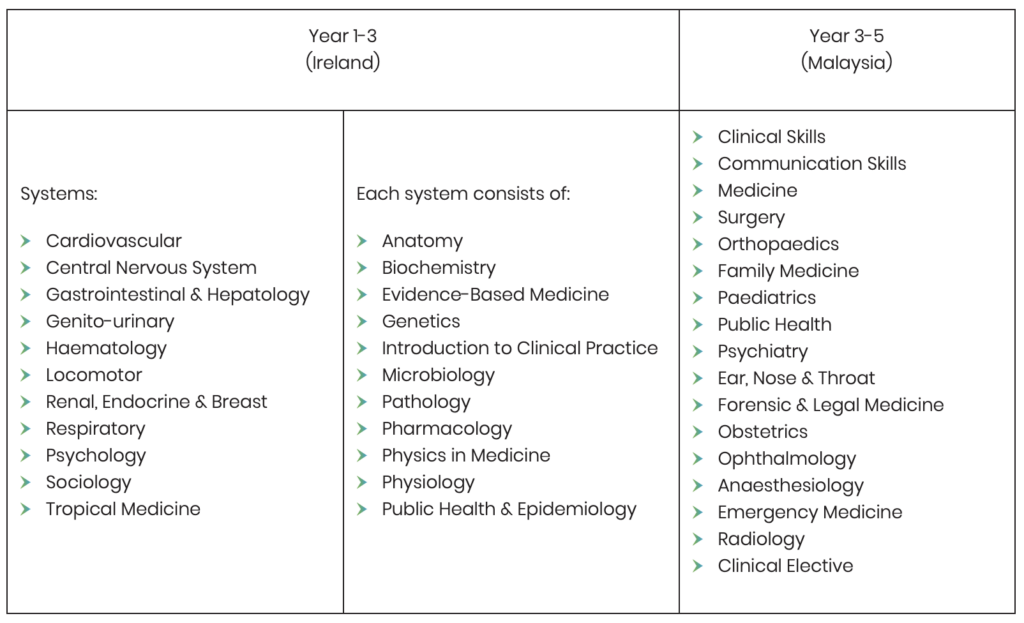
A medical undergraduate syllabus, such as the one offered by RUMC.
The MBBS curriculum is meticulously designed to encompass a wide range of subjects, ensuring that graduates are well-equipped for the medical field. As the course progresses, students are introduced to various clinical subjects and specialisations. This latter phase is more hands-on, with direct patient care under supervision.
Here is a non-exhaustive overview of the various subjects in a typical MBBS syllabus, starting from preclinical to the specialisations.
Anatomy
Anatomy is the study of the physical structure of organisms and their parts. In medical education, it involves learning about the human body’s systems, organs, tissues, and cells. It’s foundational for understanding the body’s function and disease mechanisms. Students explore various aspects like skeletal, muscular, nervous, and cardiovascular systems, often using dissections and medical imaging. This knowledge is critical for diagnosing illnesses, performing surgeries, and understanding bodily functions.
Biochemistry
Biochemistry in medicine focuses on understanding chemical processes within and related to living organisms. It bridges biology and chemistry, studying molecules like DNA, proteins, and lipids in the body. This subject helps students understand how various biochemical processes affect health, disease, and treatment. Topics include metabolism, enzyme function, genetic coding, and molecular mechanisms of disease. Biochemistry is essential for understanding drug actions, diagnostic tests, and the molecular basis of health and disease.
Surgery
Surgery involves techniques to treat injuries, diseases, and deformities through operative manual and instrumental interventions. It encompasses a broad range of procedures from minor to major operations. Surgical training includes mastering anatomy, sterile techniques, instrumentation, and postoperative care. Surgeons need to have excellent hand-eye coordination, decision-making skills, and a deep understanding of human anatomy and pathophysiology.
Paediatrics
Paediatrics is dedicated to the medical care of infants, children, and adolescents. It covers a wide range of health aspects from preventive health care to the diagnosis and treatment of acute and chronic diseases. Paediatricians must understand the unique physiological and developmental needs of children, how illnesses present differently than in adults, and the impact of growth and development on disease and treatment.
Housemanship and Internships
Integral to the MBBS course is practical training, including clinical rotations in various departments. Students engage in real-world medical settings, from outpatient clinics to operating rooms, under the supervision of experienced medical professionals. This hands-on experience is critical for developing clinical skills, bedside manners, and a holistic understanding of patient care.
Entry requirements
While the entry requirements may vary from university to university, there are general criteria that most medical schools adhere to. Malaysian students considering MBBS must be aware of these essential requirements to prepare accordingly.
Academic Excellence
The primary criterion for MBBS admission is strong academic performance. Aspiring medical students must have excellent grades, particularly in science subjects like Biology, Chemistry, and Physics. Most medical schools require:
- A high GPA in pre-university qualifications such as STPM, A-Levels, or equivalent.
- Strong SPM results, with minimum Bs in science subjects and mathematics.
- Some universities also consider scores from entrance exams like the UMAT, BMAT, or MCAT.
Health requirements
Candidates must be medically fit to undertake the MBBS course. This includes a comprehensive health check-up, often including a physical examination, vision and hearing tests, and certain immunisations. Some universities may have specific health criteria, ensuring that students can handle the physical demands of the medical profession.
Interview
Medical schools typically interview shortlisted applicants and potential scholarship awardees. During the interview, your communication skills, ethical reasoning, and empathy are evaluated, along with your motivation for choosing medicine as a career path. The format might vary from traditional interviews to Multiple Mini Interviews (MMIs), each designed to assess your suitability for the demanding yet rewarding field of medicine comprehensively.
Special requirements for international students
For Malaysian students aspiring to study MBBS abroad or for international students applying to Malaysian institutions, additional considerations include:
- Language Proficiency: Non-native English speakers often need to prove their proficiency through tests like IELTS or TOEFL.
- Visa and Legal Documentation: Valid student visas and compliance with the immigration policies of the host country.
- Cultural Awareness: Understanding and adapting to the cultural norms and educational styles of the host country.
Please be aware that entry requirements can differ based on your nationality and the country of origin, as well as the specific medical school you are applying to. We advise you to carefully review the criteria set by each institution, as these variations can significantly impact your application process
RUMC, boasting 400 years of excellence in Irish medical education, offers straightforward entry requirements for international students. For more comprehensive details and guidance, we encourage you to explore our website or reach out to us directly.
Career pathway
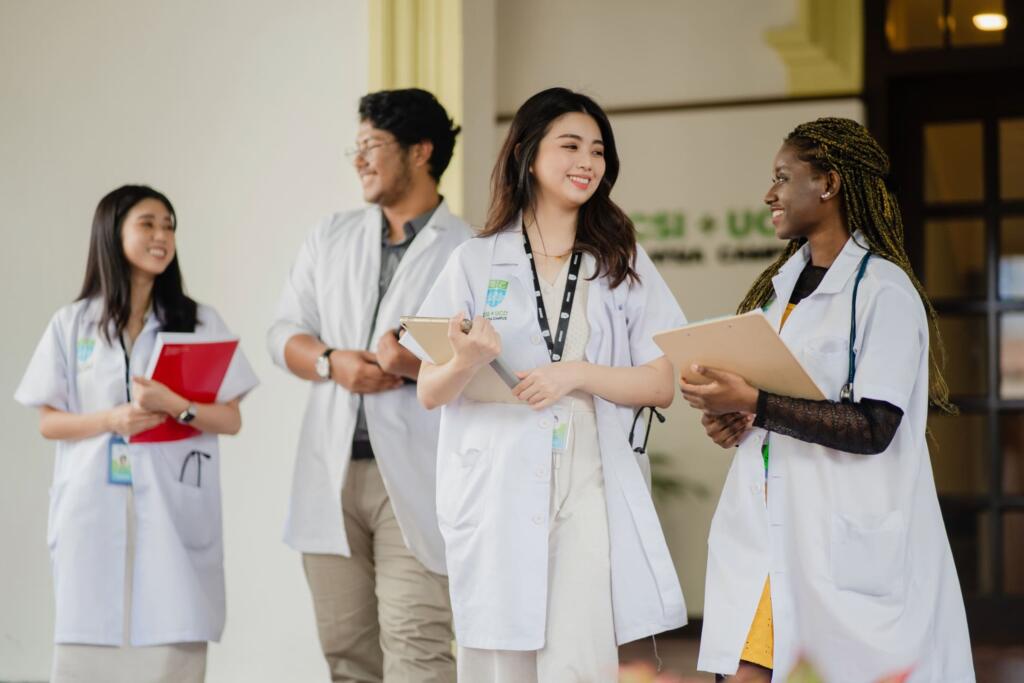
Upon completing the MBBS degree, graduates embark on a structured career pathway in the medical field. This journey involves several key stages, starting with a one-year internship post-graduation.
Internship and Housemanship
The internship is crucial for gaining practical experience across different medical disciplines. In Malaysia, graduates then undergo a compulsory two-year housemanship, working as house officers in various hospital departments such as surgery, internal medicine, and paediatrics, which is vital for hands-on clinical training and skill development.
Full Registration and Medical Residency
After completing their housemanship, graduates receive full registration with the Malaysian Medical Council or an equivalent authority in other countries, allowing them to practise medicine independently. Following this, many opt for residency programs, specialising in areas like general medicine, surgery, obstetrics and gynaecology, or paediatrics. These residencies, lasting anywhere from three to six years, are essential for further honing medical skills.
Specialist and Fellowship Training in Medicine
Post-residency, doctors have the opportunity to pursue specialist training in their chosen fields, which involves additional years of training and examinations. For those aiming for super-specialization, fellowships provide advanced training in sub-specialties such as cardiology, neurosurgery, or oncology. Continuing Medical Education (CME) is also a critical aspect, requiring doctors to engage in continuous learning and professional development through workshops, conferences, and additional courses.
Career Advancement and Private Medical Practice
Career advancement opportunities in medicine are diverse and rewarding. Doctors can progress to senior clinical roles, engage in academic medicine, or take up leadership positions in healthcare administration. Finally, after gaining substantial experience and the necessary certifications, doctors may choose to set up their private practice, marking a significant milestone in their medical career.
Study and Work-Life Balance of MBBS Graduates
MBBS students engage in an intensive curriculum that requires significant time and effort. Their days are often filled with lectures, practical sessions, and studying for exams. The pressure to maintain high academic standards can lead to long hours of study, sometimes at the expense of personal time and extracurricular activities. However, successful students often find ways to integrate study with personal interests and relaxation, maintaining a healthy balance.
Transitioning to Professional Life
After graduation, the balance shifts as MBBS graduates enter the demanding world of medical practice. The early years are particularly intense, with long hours during internships and residencies. New doctors face the challenge of applying their knowledge in high-pressure, real-world situations, often requiring extended working hours and on-call duties. Balancing professional responsibilities with personal life becomes more complex during this phase.
Long-Term Balance
As they settle into their medical careers, doctors often gain more control over their schedules, allowing for a better work-life balance. With experience, they learn to manage their time efficiently, balancing patient care, professional development, and personal life. The key to maintaining a healthy balance is continuous adaptation and self-care, ensuring that the demands of the medical profession do not overshadow personal well-being and relationships.
MBBS Fees in 2024
If you’re considering pursuing an MBBS degree, it’s crucial to plan financially for this significant investment in your future. Here’s a guide to help you and your family prepare:
- Tuition Fees: The primary expense is tuition. For both local and international students, fees vary depending on the university’s offerings and reputation. International students typically face higher fees.
- Living Expenses: Consider the costs of accommodation, food, and transportation. These expenses will differ based on the city where the university is located and your personal lifestyle choices.
- Additional Costs: Remember to budget for books, medical equipment, insurance, and other miscellaneous expenses. These are often overlooked but can add up.
- Travel and Visa for International Students: If you’re an international student, include travel costs to and from Malaysia and visa fees in your budget. These can vary widely.
- Long-term Budgeting: Since MBBS programs are typically multi-year, it’s important to plan for the entire duration of the course. Keep in mind that tuition fees typically increase annually.
- Financial Aid and Scholarships: Investigate scholarship opportunities and financial aid options. Many institutions offer support to reduce the financial burden on students.
- Currency Fluctuations: For international students, be aware of currency exchange rates, as they can significantly affect your expenses.
This guideline is intended to help you and your family make a well-informed decision about pursuing a medical degree. For the most accurate and specific details, consult directly with the admissions or financial aid offices of the universities you are considering.
Local Fees (Malaysians)
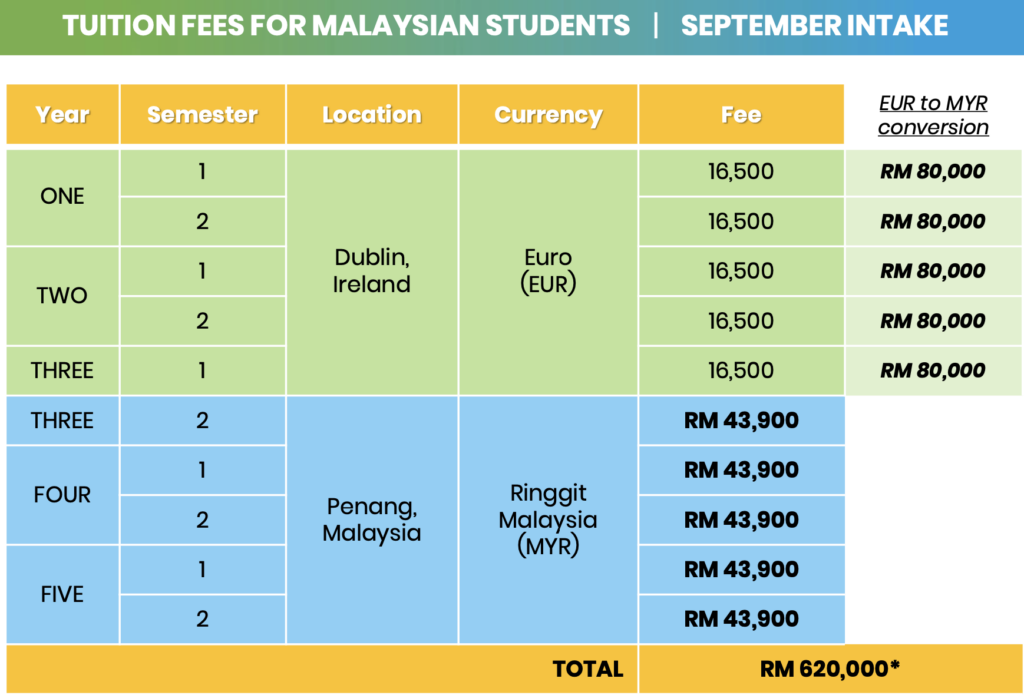
The total tuition fees for Malaysian students pursuing a medical undergraduate in RUMC is RM 620,000*.
For Malaysian students, over the course of five years, you can expect the total tuition fees to be around RM 630,000*. However, when factoring in living expenses, books, and other miscellaneous costs, parents and students should consider preparing a budget that may extend to approximately RM 700,000 to RM 750,000 over the five-year period to cover the complete educational experience in both Ireland and Malaysia.
International Student Fees
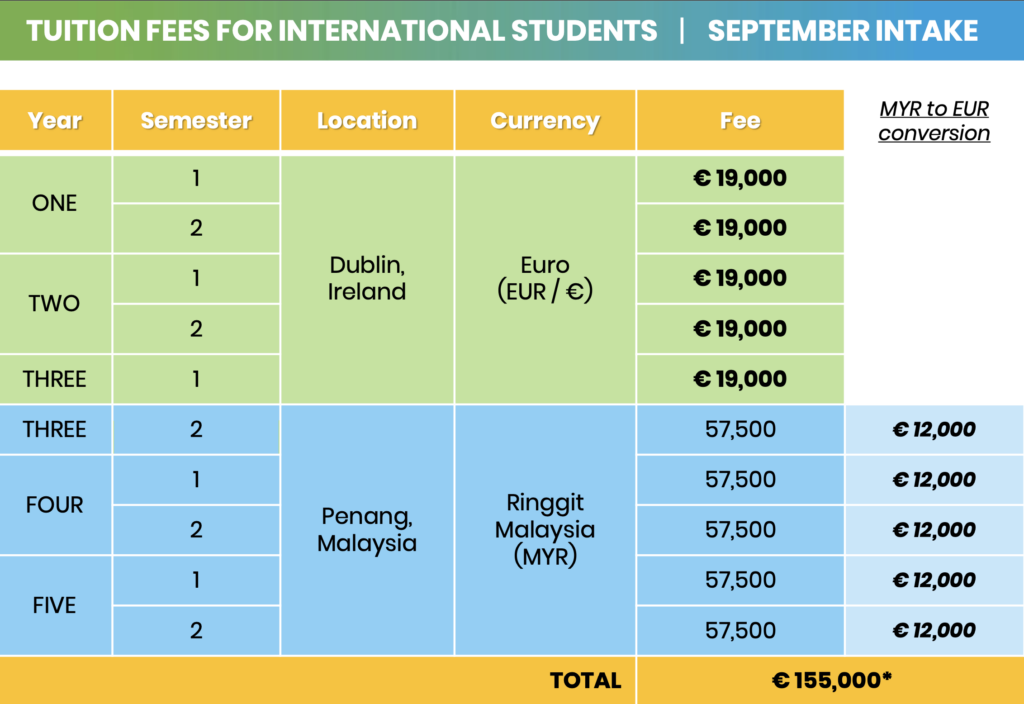
The total tuition fees for international students pursuing a medical undergraduate in RUMC is €155,000*.
For international students, the total tuition fees come to approximately €156,000*. In addition to tuition, other expenses to consider are living costs in both Ireland and Malaysia, which can vary based on personal lifestyle, as well as books, equipment, and travel. The total effective budget may range from €200,000 to €220,000over the five years, accounting for the time spent in both Dublin and Penang, Malaysia.
Scholarships
Many medical schools, including RUMC, offer a range of scholarships to deserving students. These scholarships are often based on academic merit, financial need, or a combination of both. They can significantly lower the cost of tuition and, in some cases, also contribute towards living expenses and academic materials.
RUMC is committed to supporting aspiring medical professionals and offers a variety of scholarships that could make your educational goals more attainable. We encourage you to explore the scholarships available at RUMC that could potentially offset a portion of your educational expenses.
MBBS (Bachelor of Medicine, Bachelor of Surgery) vs MD (Doctor of Medicine)
The MBBS (Bachelor of Medicine, Bachelor of Surgery) is an undergraduate degree establishing foundational medical knowledge, whereas the MD (Doctor of Medicine) is often pursued post-MBBS, specialising in advanced medical fields and research. The MD’s role varies globally: in some countries, it’s a postgraduate specialisation, while in others, it’s an undergraduate degree equivalent to the MBBS.
Conclusion
If you’re aspiring to embark on a rewarding journey in medicine, RUMC’s undergraduate medical course offers a comprehensive pathway to becoming a doctor. This course is rooted in 400 years of Irish medical education excellence and offers a rare opportunity to study at one of Ireland’s leading medical schools. It uniquely delivers an internationally recognised Irish medical education in a transnational setting, giving students a well-rounded global perspective in their medical training.
Discover more about RUMC and how it could be the right step in your journey to becoming a doctor
